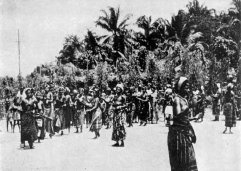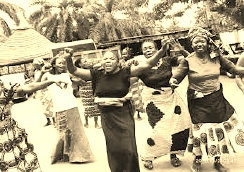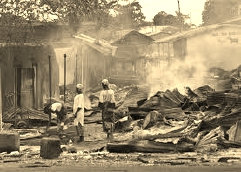Igwe as the Ruler of Inyi, will have his own cabinet of elders (sometime regarded as Nze na Ozo), including some judges, for the daily running of the town’s affairs and image promotion.
His is also resolutely supported by the Chief Priest (Eze Ajala) who duties are to intercede with the gods of the land.
INYI OKEROME was a group of elders, normally representatives of every family in Inyi. Who discussed and judge on all matters concerning Inyi as a whole.
These level of leaders accounted for the organic or living law of the indigenous people of inyi regulating their lives and transactions. It is organic in that it is not static. It is regulatory in that it controls the lives and transaction of the community of Inyi.
It is said that custom is a mirror of the culture of the people. One must differentiate between a custom and a customary law.
A custom is a rule of conduct. When such a rule of conduct attains a binding or obligatory character it becomes a customary law. It is the agreement of the community that gives a rule of conduct its obligatory nature and entails, that it is supported by a sanction and enforceable. Customary sanction takes the form of ostracism, compensation, propitiation, restoration or apology. It is this element of sanction that distinguishes a custom from customary law.
Nonetheless, customary law goes further and imports justice to the lives of all its subjects.
With the introduction of the British in Igboland, the government of the Colonial Nigeria, in agreement with the local communities created systematic native courts under the native courts proclamation, 1900. The British instituted Native Courts and installed chiefs by warrant (hence the name) who controlled them. Frequently, Warrant Chiefs were installed arbitrarily.
This system of native courts was established on a legal basis, the decree provided for two types of native court:
1. Native Council: This consisted of the district commissioner as president/Assessor and others appointed by warrant to represent the various villages or towns served by the court.
2. Minor Court: This consisted of such numbers/members as the high commissioner deemed fit to appoint. If the number was tree or more, they would elect their own president/Assessor periodically.
A Chief would have a written letter of appointment from at least the State level of the Government authorizing him to operate as a Chief, a Court assessor, judge, chairman or president of Native council and Courts of a specified region such as the whole of Inyi Town.
In some cases, personalities were installed who actually had been local leaders before, but more often than not it was an accidental affair. Sometimes, the villagers forwarded people of little standing in the community to the British, on the periphery of Igboland, in some areas this was fully conducted by a Foreigner or British administrative commissioner. The local Chiefs and Ruling Council were only consulted when the president needed assistance on some points of customary law.
It is important to note here that the court (native council) did not truly represent the traditional native court. This was because the court was dominated by its president, the district commissioner, whose presence deprived the natives of any say in the decisions being reached by the court.
The customary court, such as the one in Inyi centre were built and established to replace the native ordinance, but all have similar provisions. The principle of repugnancy therefore became part of the law both through observance by the courts and the enactments.
The British were forced to re-examine their entire system of government in Igboland, following the Aba Riots in 1929 and women up rising known to be the Women’s war of 1929, across most southern towns. The warrant Chief system was finally abolished.
The newly emerging educated elite increasingly exerted pressure to be represented in local politics. By the 1940s, the British administration followed what was called the ‘Best Man Policy’ and Inyi people called them Okachamma as different from Eze (Chief).
From then on, not every Chairman or President of Customary Court was a Chief even if most of them got rich through official perquisites and gratification
It is argued that the introduction of English law in general and the repugnancy clause in particular abolished some obnoxious practices in the traditional ways of life. Such as: - Human sacrifice, Slavery, abandonment of twins or babies with Upper first tooth in the forest, etc. Due to believe they were ungodly to the local Deity.
Initially, it was feared that the repugnancy principle would be applied and manipulated in a manner detrimental to the continued existence of the customary law of the Igbo people.
Customary law in spite of attempts to relegate it, continues to assert its relevance in present day society. Customary law protects certain human interest. Customary law is relevant mainly because of its underlying values. These underlying values are important in the maintenance of social cohesion.
Customary courts dispense substantial justice without utmost regard to technicalities. If certain procedures and technicalities are likely to cause hardships, the court will disregard it if the ends of justice will be met. Oral applications are permissible, proceeding before the customary court is devoid of common law legal technicalities, thus it is able to provide for fast and inexpensive form of justice dispensation.
JURISDICTION OF THE COURTS.
The jurisdiction of customary courts is unlimited with respect to,
1. Matrimonial causes.
2. Cases involving debt, demand and liquidated damages.
3. Guardianship and custody of children under customary law.
4. Inheritance upon intestacy under customary law and grant of powers to administer the estate on an intestacy under customary law.The jurisdiction of the customary courts in land matters is however limited on subject to the Land Use Act.
The court was empowered to award punishment (nature) not repugnant to natural justice or the principal in the law of England.
As time went on, the Customary Court ceased to operate. With Some higher courts at Oji river and Enugu.
Eventually the indigenes of Inyi with a new found educational elite, Further structured Town Unions, In reflection to age grades of the past for more focus on development and Infrastructural progress in Inyi.
His is also resolutely supported by the Chief Priest (Eze Ajala) who duties are to intercede with the gods of the land.
INYI OKEROME was a group of elders, normally representatives of every family in Inyi. Who discussed and judge on all matters concerning Inyi as a whole.
These level of leaders accounted for the organic or living law of the indigenous people of inyi regulating their lives and transactions. It is organic in that it is not static. It is regulatory in that it controls the lives and transaction of the community of Inyi.
It is said that custom is a mirror of the culture of the people. One must differentiate between a custom and a customary law.
A custom is a rule of conduct. When such a rule of conduct attains a binding or obligatory character it becomes a customary law. It is the agreement of the community that gives a rule of conduct its obligatory nature and entails, that it is supported by a sanction and enforceable. Customary sanction takes the form of ostracism, compensation, propitiation, restoration or apology. It is this element of sanction that distinguishes a custom from customary law.
Nonetheless, customary law goes further and imports justice to the lives of all its subjects.
With the introduction of the British in Igboland, the government of the Colonial Nigeria, in agreement with the local communities created systematic native courts under the native courts proclamation, 1900. The British instituted Native Courts and installed chiefs by warrant (hence the name) who controlled them. Frequently, Warrant Chiefs were installed arbitrarily.
This system of native courts was established on a legal basis, the decree provided for two types of native court:
1. Native Council: This consisted of the district commissioner as president/Assessor and others appointed by warrant to represent the various villages or towns served by the court.
2. Minor Court: This consisted of such numbers/members as the high commissioner deemed fit to appoint. If the number was tree or more, they would elect their own president/Assessor periodically.
A Chief would have a written letter of appointment from at least the State level of the Government authorizing him to operate as a Chief, a Court assessor, judge, chairman or president of Native council and Courts of a specified region such as the whole of Inyi Town.
In some cases, personalities were installed who actually had been local leaders before, but more often than not it was an accidental affair. Sometimes, the villagers forwarded people of little standing in the community to the British, on the periphery of Igboland, in some areas this was fully conducted by a Foreigner or British administrative commissioner. The local Chiefs and Ruling Council were only consulted when the president needed assistance on some points of customary law.
It is important to note here that the court (native council) did not truly represent the traditional native court. This was because the court was dominated by its president, the district commissioner, whose presence deprived the natives of any say in the decisions being reached by the court.
The customary court, such as the one in Inyi centre were built and established to replace the native ordinance, but all have similar provisions. The principle of repugnancy therefore became part of the law both through observance by the courts and the enactments.
The British were forced to re-examine their entire system of government in Igboland, following the Aba Riots in 1929 and women up rising known to be the Women’s war of 1929, across most southern towns. The warrant Chief system was finally abolished.
The newly emerging educated elite increasingly exerted pressure to be represented in local politics. By the 1940s, the British administration followed what was called the ‘Best Man Policy’ and Inyi people called them Okachamma as different from Eze (Chief).
From then on, not every Chairman or President of Customary Court was a Chief even if most of them got rich through official perquisites and gratification
It is argued that the introduction of English law in general and the repugnancy clause in particular abolished some obnoxious practices in the traditional ways of life. Such as: - Human sacrifice, Slavery, abandonment of twins or babies with Upper first tooth in the forest, etc. Due to believe they were ungodly to the local Deity.
Initially, it was feared that the repugnancy principle would be applied and manipulated in a manner detrimental to the continued existence of the customary law of the Igbo people.
Customary law in spite of attempts to relegate it, continues to assert its relevance in present day society. Customary law protects certain human interest. Customary law is relevant mainly because of its underlying values. These underlying values are important in the maintenance of social cohesion.
Customary courts dispense substantial justice without utmost regard to technicalities. If certain procedures and technicalities are likely to cause hardships, the court will disregard it if the ends of justice will be met. Oral applications are permissible, proceeding before the customary court is devoid of common law legal technicalities, thus it is able to provide for fast and inexpensive form of justice dispensation.
JURISDICTION OF THE COURTS.
The jurisdiction of customary courts is unlimited with respect to,
1. Matrimonial causes.
2. Cases involving debt, demand and liquidated damages.
3. Guardianship and custody of children under customary law.
4. Inheritance upon intestacy under customary law and grant of powers to administer the estate on an intestacy under customary law.The jurisdiction of the customary courts in land matters is however limited on subject to the Land Use Act.
The court was empowered to award punishment (nature) not repugnant to natural justice or the principal in the law of England.
As time went on, the Customary Court ceased to operate. With Some higher courts at Oji river and Enugu.
Eventually the indigenes of Inyi with a new found educational elite, Further structured Town Unions, In reflection to age grades of the past for more focus on development and Infrastructural progress in Inyi.
Inyi Welfare Association (IWA) was formed in January of 1954 for the development and promotion of inyi town and its people’s objective through the rigors of a forming community. Formed from groups of learned and highly philosophical Inyi citizens, from such back ground as the Literary and Debating society within Inyi in those days. With branches nationwide IWA quickly made its impact in Inyi and its infrastructures even before the civil war in Nigeria.
They planned and built Inyi Post Office, Which also doubled as the IWA Home office, and mapping and stalling of Nkwo Inyi market, sponsoring citizens, including the installation of the famous Monument of Nkwo Inyi Round About (A woman seating and moulding a pot) in 1960 for the Nigerian Independence day and a reflection to Inyi Pottery Industry.
Other project that was undertaken or Lobbied by Inyi Welfare Association was the aiding of construction of Inyi Girls High School in Amankwo, Inyi Boys High School, and a Medical Center.
This town union was later reverted to the Inyi Town Union in the late 80s, and subsequently Inyi Development Union (IDU) in 1989. Which was followed by Inyi Caretaker Committee (ICC) in 1999. They lead the reformation of autonomous village boundaries within Inyi town at the State Government level. As well as road rehabilitations projects. This has recently given way to the return of IDU, which is more frequently called Inyi Town Union (ITU).

Oji River Local Government Area, Enugu State, Nigeria
News Highlights....
|
Inyi News and Events |
Inyi Culture and highlights
Inyi people are governed by definite rules of conduct from cradle to grave. The discipline infused by these rules of conduct, are a mirror of its rich culture and Heritage. Producing a uniformity, which others see and admired in Inyi people.
Its customary laws and customs were definite, detailed, and covered by aspect of Inyi life; so that, by their existence, they attested to the antiquity of Inyi town. As it must have taken centuries of usage, and trial and error, before they could have become so generally accepted, and enforced, as law, among the people of Inyi.
There is a strong tie in religious observations, trade, marriages, Birth and Death. In each community there are associations of age grades; Social groups, Town Unions, Native councils and Traditional Rulers (Ndi Igwe, Nze na Ozo), poor and rich citizens interact with one another in war or in peace. The social organization developed in the form of an extended family to a kind of village government. All participate in community affairs, in decision-making and all development efforts, Based on the background shared, the Art, Food, Dialect and Cultural ways of life are also shared and frequently the same.
Its customary laws and customs were definite, detailed, and covered by aspect of Inyi life; so that, by their existence, they attested to the antiquity of Inyi town. As it must have taken centuries of usage, and trial and error, before they could have become so generally accepted, and enforced, as law, among the people of Inyi.
There is a strong tie in religious observations, trade, marriages, Birth and Death. In each community there are associations of age grades; Social groups, Town Unions, Native councils and Traditional Rulers (Ndi Igwe, Nze na Ozo), poor and rich citizens interact with one another in war or in peace. The social organization developed in the form of an extended family to a kind of village government. All participate in community affairs, in decision-making and all development efforts, Based on the background shared, the Art, Food, Dialect and Cultural ways of life are also shared and frequently the same.
Customary Law
Inyi Nwa-Ocho Ucho.........................



Inyi Town Unions
Copyright © 2013 Inyitown.com and Inyi.co.uk - All Rights Reserved
Like our Page

